Imagine a world where the League of Nations successfully prevented the rise of fascism. In this alternate reality, the ghosts of World War II never haunted humanity.
How would this change history? The League's triumph over fascism in its infancy would have set a powerful precedent for international cooperation and conflict resolution.
This outcome would shape a world where dictators were held accountable and diplomacy prevailed over militarism.
The League's Early Successes
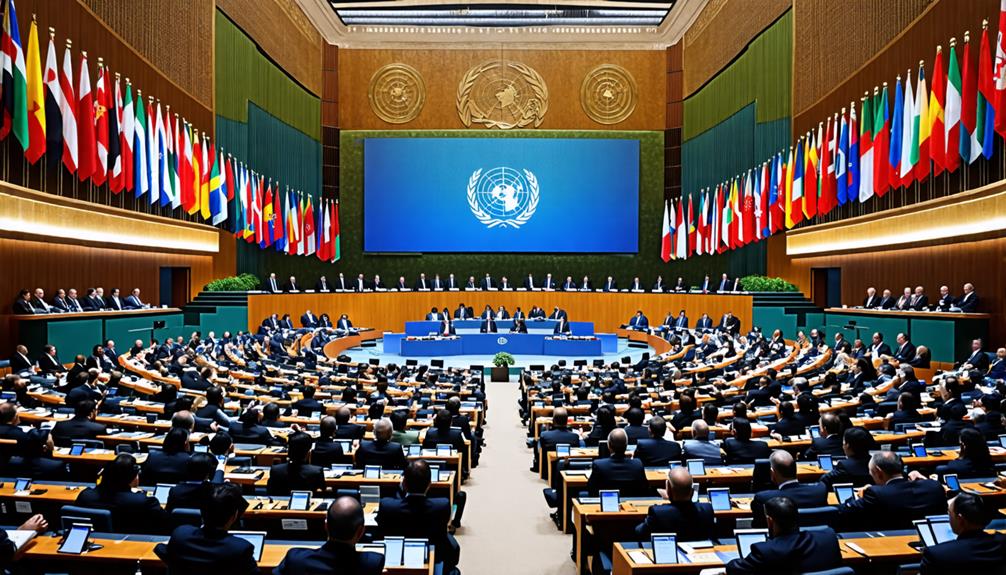
In an alternate timeline, the League of Nations' early successes might've led to a more stable and peaceful world. One theory is that the League's effective resolution of territorial disputes and humanitarian crises could have bolstered its credibility and influence, encouraging more nations to join and cooperate.
It's possible that a stronger League of Nations might've been better equipped to address the rise of fascism and prevent the outbreak of World War II. However, it's also conceivable that the League's success could have led to complacency, causing nations to underestimate the threat posed by aggressive states.
Interestingly, the United Nations, established after World War II, did adopt some of the League's principles and structures. This suggests that even in our timeline, the League of Nations' early successes provided valuable lessons for future international organizations.
Economic Sanctions Against Aggressors
In an alternate timeline, the League of Nations might've imposed economic sanctions on aggressive states to curb the rise of fascism. Such measures could have included cutting off trade, freezing assets, and blocking financial transactions of nations violating international law.
One theory is that this would have crippled the economies of fascist regimes, weakening their ability to wage war and oppress their citizens. However, it's also possible that sanctions might've further radicalized these governments and led to even more extreme policies.
It's worth noting that economic sanctions were later used by the United Nations and other international bodies in response to acts of aggression or human rights abuses. The effectiveness of these sanctions has varied, and their impact on civilian populations remains a topic of debate.
Diplomatic Pressure on Mussolini
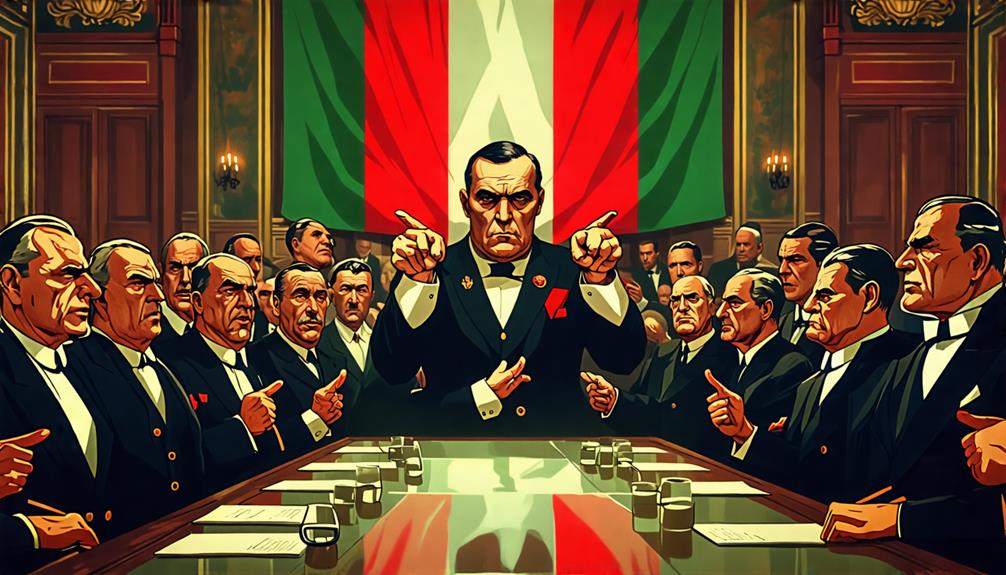
In an alternate timeline, the League of Nations might've applied diplomatic pressure on Benito Mussolini's fascist regime in Italy to limit its expansionist goals and human rights violations. The League could have denounced Italy's actions, insisted on policy reforms, and mobilized global resistance. Through sustained diplomacy, the League may have isolated Mussolini, undermined his authority, and averted Italy's aggressive wars and alliance with Hitler.
While this scenario didn't play out historically, some theorize it could have significantly altered the course of events leading up to World War II. It's possible that without Italy's alliance, Germany would have been more constrained militarily and politically. However, others argue that diplomatic pressure alone may not have been sufficient to deter Mussolini's ambitions.
Interestingly, in the 1990s the UN Security Council did impose diplomatic pressure and sanctions on Saddam Hussein's Iraq in an effort to curb its aggression and pursuit of weapons of mass destruction, though the effectiveness of this approach remains debated.
Confronting Hitler's Germany
If the League of Nations had taken a bolder stand against Hitler's Nazi regime in the 1930s, the course of history could have been significantly altered. One theory is that strict economic sanctions and a united diplomatic front might've crippled Germany's rearmament efforts and forced Hitler to reconsider his aggressive policies.
Alternatively, it's possible that threatening military intervention would have led to an earlier outbreak of war, with uncertain consequences.
While this scenario didn't play out in the 1930s, some argue that a similar approach was taken decades later against Saddam Hussein's Iraq, with economic sanctions and the threat of military action.
However, the effectiveness of such measures remains a topic of debate among historians and political analysts.
Ultimately, it's up to the reader to consider the potential ramifications of a more assertive League of Nations in the face of Nazi aggression.
Strengthening Collective Security
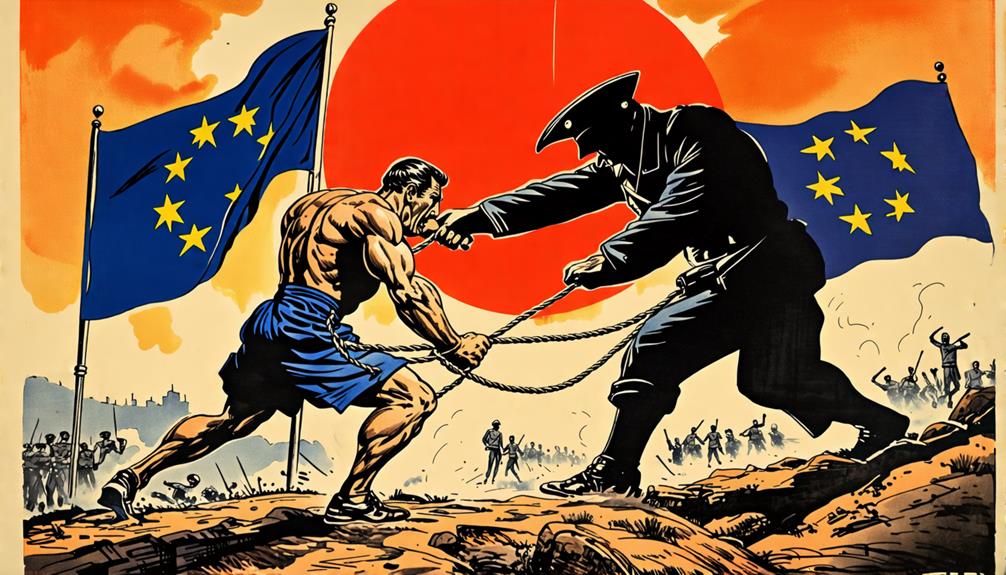
If the League of Nations had strengthened its collective security system, it's possible fascist expansion in the 1930s could have been confronted more forcefully. One theory is that giving the League greater ability to coordinate economic sanctions and joint military action against aggressors might've deterred or stopped invasions by Germany, Italy, and Japan early on.
However, this would have required member states to yield more sovereignty to the League and firmly commit to defending each other, which many nations were reluctant to do at the time.
Interestingly, some aspects of this scenario did play out decades later with the formation of the United Nations and NATO after World War II. These organizations incorporated stronger collective security measures, such as the UN Security Council and NATO's mutual defense clause.
It remains an open question how history might've unfolded if a more robust version of the League had existed in the interwar years.
Promoting Disarmament and Demilitarization
If the League of Nations had pursued more aggressive disarmament and demilitarization policies, it may have led to several possible outcomes. One theory is that it could have limited the military capabilities of fascist states, making it more difficult for them to wage war and expand their reach.
However, another possibility is that these measures might've faced significant resistance from nations unwilling to give up their military power, leading to increased tensions and potential conflicts.
In the years following World War II, the United Nations did adopt some policies aimed at promoting disarmament and demilitarization, such as the Nuclear Non-Proliferation Treaty of 1968.
While these efforts have had varying degrees of success, they demonstrate the ongoing challenge of balancing national security interests with the goal of global peace and stability.
Addressing the Great Depression

Had the League of Nations taken bold steps to address the Great Depression, it might've mitigated the economic desperation that fueled the rise of fascism. One theory is that coordinated efforts to stimulate economies, provide relief, and promote global cooperation could have reduced the appeal of extremist ideologies. It's possible this would have led to a more stable and prosperous world in the 1930s and beyond.
However, it's also conceivable that such interventions might've faced political resistance or unintended consequences. Some argue that excessive government involvement could have prolonged the depression or created new economic distortions. Ultimately, the impact would have depended on the specific policies implemented and how effectively nations collaborated.
Interestingly, after World War II, the United Nations and Bretton Woods institutions did pursue some of these strategies on a global scale. The International Monetary Fund, World Bank, and General Agreement on Tariffs and Trade aimed to promote economic stability, reconstruction, and cooperation in the postwar era. While imperfect, these efforts helped shape the modern international economic system.
Fostering International Cooperation
In an alternative history, the League of Nations might've taken additional steps to foster international cooperation and counter the spread of fascist ideologies. This could have involved increased diplomatic engagement between member states to address rising tensions, joint statements denouncing extremist rhetoric and human rights abuses, and coordinated efforts to promote democratic values and counter propaganda.
One theory is that through greater unity, the League of Nations might've diminished fascism's appeal in the 1930s. It's possible that similar efforts were attempted later by other international organizations, such as the United Nations, to address authoritarian ideologies during the Cold War era.
Lasting Impact on Global Politics
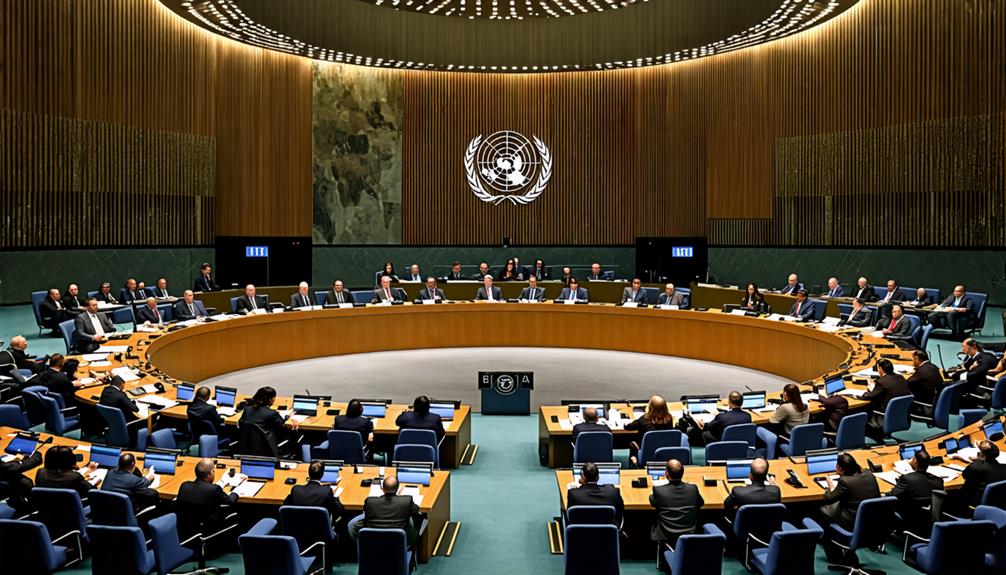
In an alternate timeline where the League of Nations successfully prevented the rise of fascism in the early 20th century, the global political landscape could have taken a different course.
One possibility is that international institutions would have gained more authority and influence, as the League's triumph would have set a powerful precedent for collective action against aggressive regimes. This might've fostered greater cooperation and trust among nations, potentially leading to more effective mechanisms for peaceful conflict resolution.
However, it's also conceivable that without the devastating consequences of World War II, the impetus for the formation of the United Nations and other post-war institutions might've been lacking. The absence of these organizations could have altered the trajectory of decolonization, the Cold War, and other major historical developments.
It's worth noting that while the League of Nations didn't succeed in this specific scenario, similar efforts to establish international order were made later in the century, such as the creation of the United Nations in 1945.
Conclusion
You stand at the crossroads of history, a fork in the road where the League's triumph over fascism shines like a beacon.
Its guiding light illuminates a path towards lasting peace, cooperation, and shared prosperity.
The shadow of war recedes, and in its place, a new era dawns—one where nations stand united, their voices joined in a chorus of hope.
The League's legacy endures, a demonstration of the power of diplomacy and collective action.
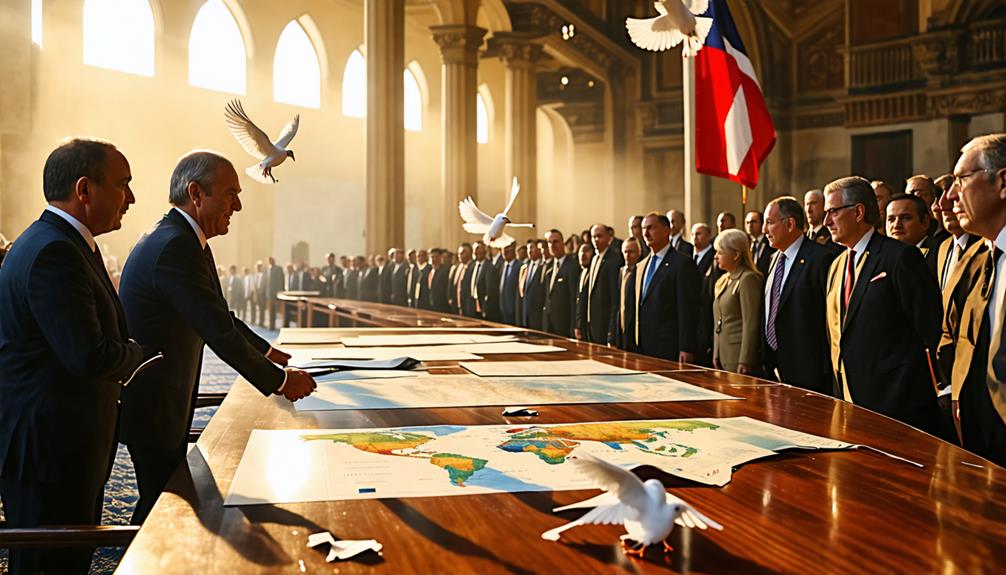
Leave a Reply